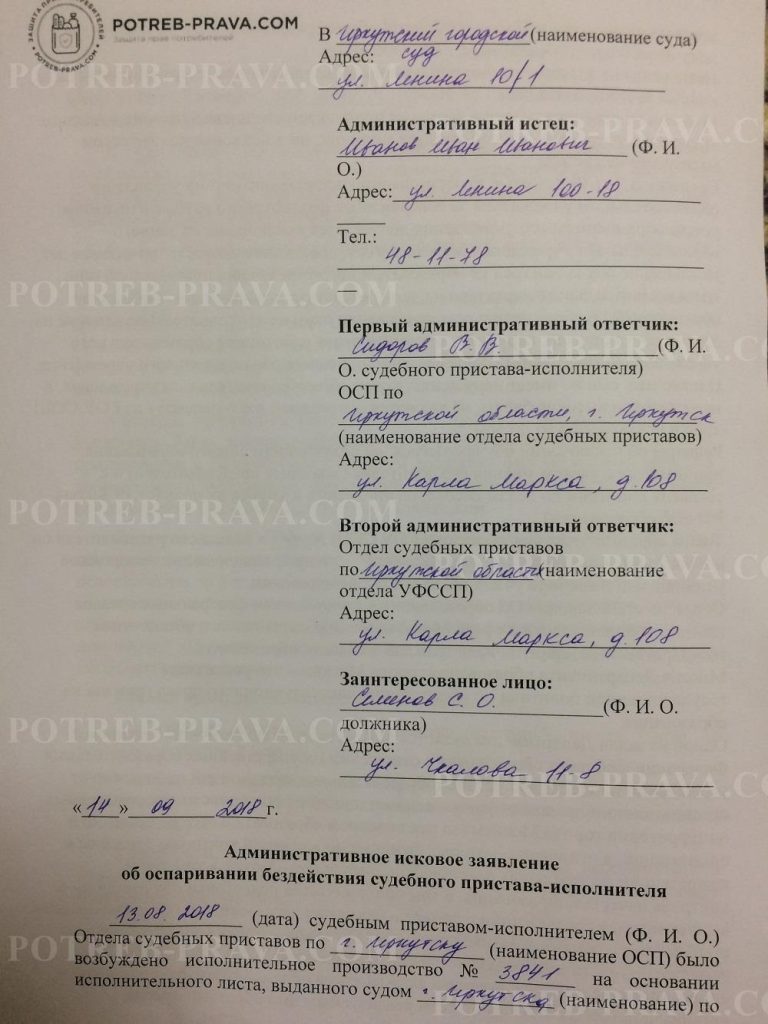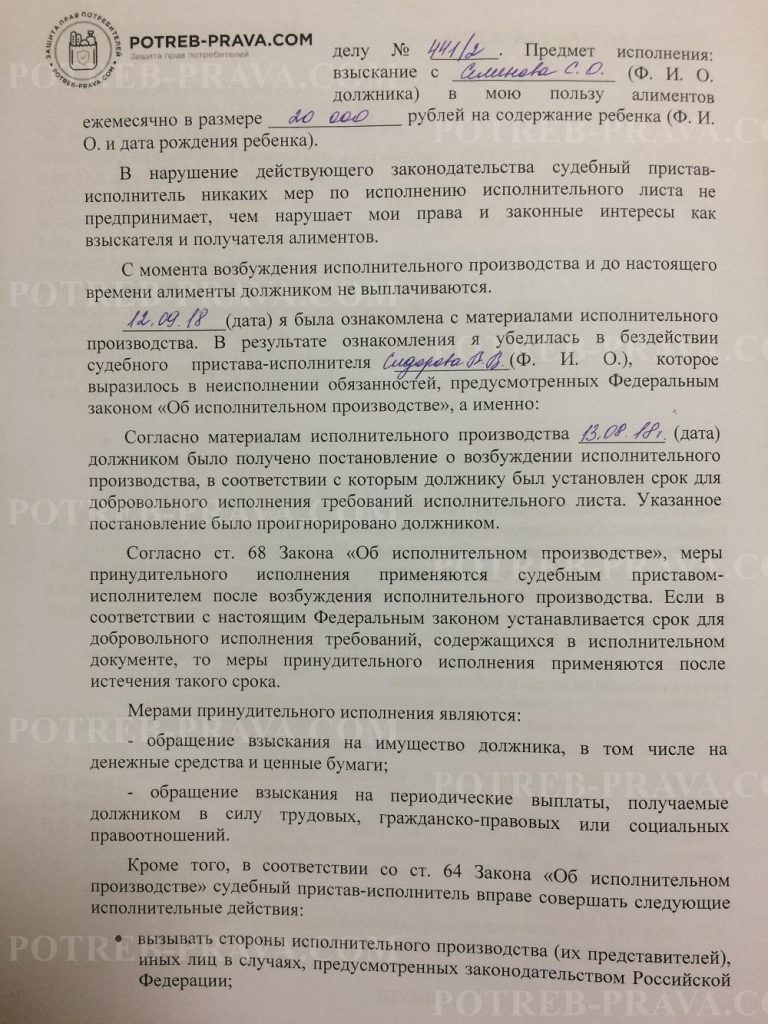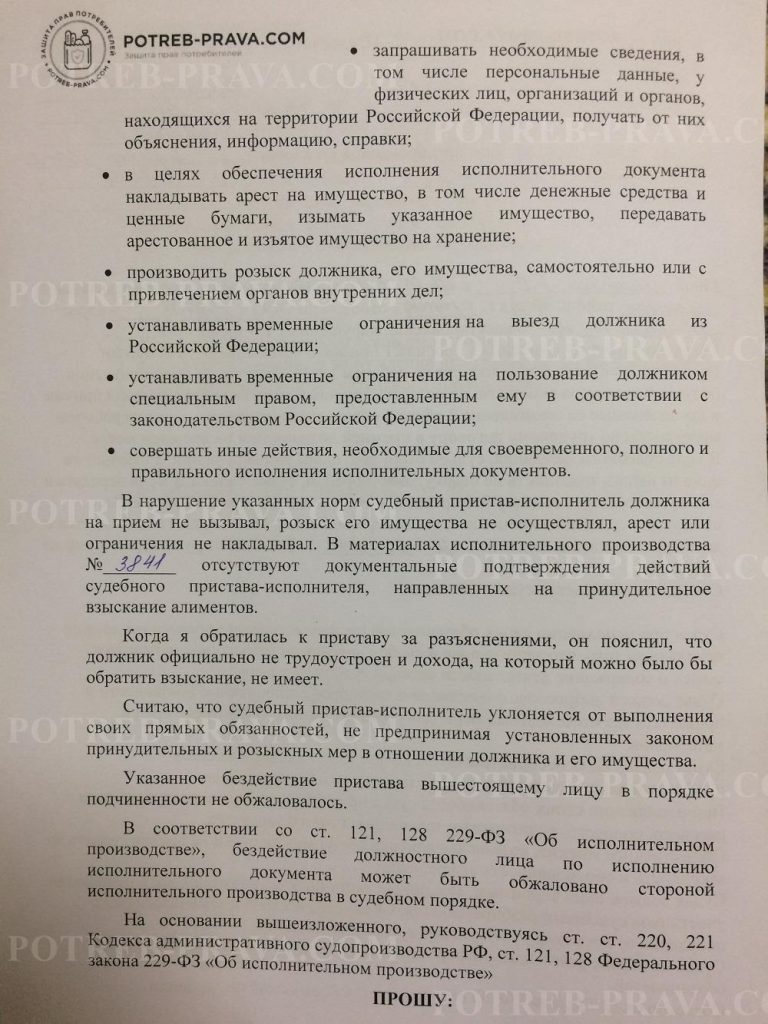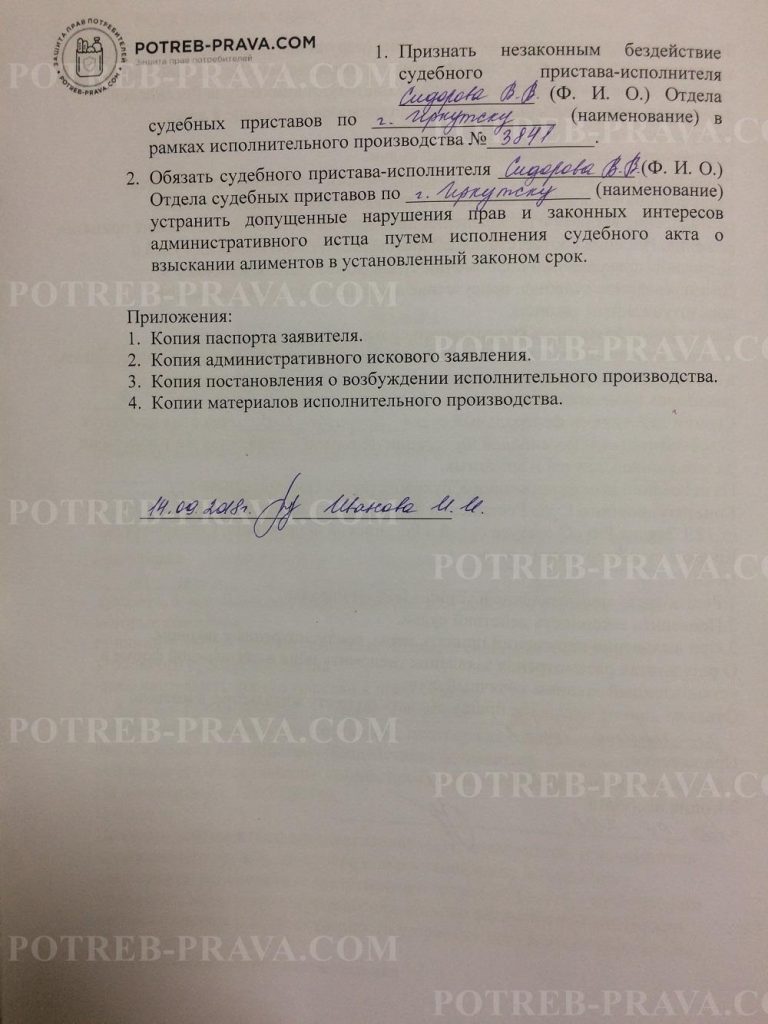5/5 (4)
Samples of complaints to the court against the actions of the bailiff
 Dear readers of our site! Our articles talk about typical methods solutions to legal issues, but each case is unique.
Dear readers of our site! Our articles talk about typical methods solutions to legal issues, but each case is unique.
If you want to know how to solve exactly your problem - contact the online consultant form on the right. It's fast and free! Or call us at telephones:
8 (499) 322-73-27
Moscow, Moscow region
8 (812) 507-82-87
St. Petersburg, Leningrad region
8 (800) 551-71-02
Federal number for other regions of Russia
If your question is voluminous and it is better to ask it in writing, then at the end of the article there is special form, where you can write it and we will forward your question to a lawyer specializing specifically in your problem. Write! We will help solve your legal problem.
ATTENTION! Look at the completed sample of an administrative claim challenging the inaction of a bailiff:




You can DOWNLOAD samples of complaints against the actions of a bailiff using the links below:
Preparation of an administrative claim against the actions of the bailiff
An administrative claim against a bailiff is filed with the court when he commits actions that violate the rights of a participant in enforcement proceedings, or when the execution of a court order is delayed.
The application filing period is 10 days from the moment the applicant became aware of the bailiff’s abuse of authority or violation of the plaintiff’s legitimate interests.
If this deadline (for filing a claim) is missed, then it is necessary to apply for restoration of the deadline for the administrative claim.
Depending on the situation, you can appeal the bailiff’s actions through higher authorities (to the FSSP Office, the official’s superior, or the prosecutor’s office). This procedure is more appropriate if the actions of the bailiff are outside the scope of enforcement proceedings or the party who committed them has not been identified.
Recommendation: before filing a claim for illegal actions or inaction of the bailiff, read the materials of the enforcement proceedings in advance. To do this, an application is prepared to the bailiff department, which indicates the number of the proceedings and the desired time frame for its study.
How to file a claim correctly
The statement of claim must be drawn up in writing. It should include the following information:
- the body to which the statement of claim was sent (judicial department);
- personal data of the applicant (place of residence, passport or legal details for the organization);
- resolution, position, full name of the bailiff whose actions will be appealed;
- grounds for appeal and content of claims;
- the circumstances under which the complained of actions were committed;
- regulatory acts that are the basis for appeal;
- applicant's signature.
In the statement of claim, you can set out in detail your understanding of the violations committed by the bailiff, as well as indicate the reasons for initiating enforcement proceedings. Be sure to list the provisions of the basic laws regulating the activities of the bailiff service.
The requirements clearly indicate which actions of the bailiff were carried out in violation, the number of the resolution that should be amended or even canceled, as well as the desired reaction of the court to the claim.
To substantiate the application, it is important to attach additional documents confirming the stated circumstances. This is not a necessary action, but if the court considers their provision significant for considering the complaint, it has the right to request it.
Additional documents may be:
- the bailiff's decision, which is being challenged;
- a copy of the resolution on enforcement proceedings;
- a copy of the claim against the bailiff;
- other documents to confirm the applicant’s arguments (certificates, sick leave, information on payment of alimony, etc.).
An application (claim) written in accordance with the rules will be accepted by the court for consideration.
Watch the video. Appealing the actions of bailiffs:
How to file a complaint
Methods of filing an application to appeal the actions of bailiffs:
- personal reception in the district court;
- by mail (registered letter with acknowledgment of delivery);
- through a proxy;
- fill out the feedback form on the official websites of the FSSP and other government agencies (electronically).
It is recommended to attach a copy or even several of it to the administrative claim. Duplicates will be needed to transfer them to the bailiff; the actions will be appealed for other interested parties if they are affected by the decision on the claim.
Important! Payment of state fees when appealing the actions of bailiffs is not provided.
Normative base

The main document on the basis of which a complaint against bailiffs is filed is Federal Law of October 2, 2007 No. 229-FZ “On Enforcement Proceedings” (Chapter 18, Articles 122-128).
The Code of Administrative Proceedings of the Russian Federation dated March 8, 2015 N 21-FZ, which discusses the deadlines for filing complaints and other legal norms, as well as the Civil Procedure Code of the Russian Federation dated November 14, 2002 No. 138-FZ, will be useful.
In addition, the activities of bailiffs are regulated by orders and regulations of the Ministry of Justice of Russia and the Bailiff Service of the Russian Federation.
Attention! Our qualified lawyers will assist you free of charge and around the clock on any issues.
Consideration of the claim
The court's consideration of claims is carried out in accordance with the procedure established by the procedural legislation of Russia.
The consideration period lasts for 10 days from the date of filing the claim with the judicial authority.
As a rule, these cases do not drag on, and the judge quickly schedules a court hearing at which he makes a decision. In this case, the judicial authority is obliged to check the appealed action and the procedure for its application for compliance with the law, and the legality of its actions will be proven by the bailiff himself.
Based on the results of the inspections, the court does not rely on arguments and complaints, but on a list of stated requirements that the plaintiff can satisfy or refuse to fulfill.